Sensor Sweep: Dungeon, Donald Wandrei, Tolkien Christmas Cards, Texas Wind
Monday , 25, December 2023 Sensor Sweep Leave a commentAppendix N (Goodman Games): We’ve talked a lot about Fritz Leiber, whose birthday we’re celebrating today, over the last few years. Leiber, born December 24th, 1910, is most widely known among gamers as the man responsible for the fantastic Fafhrd and Gray Mouser stories. In the years running up to DCC Lankhmar, a lot of ink has been spilled discussing Leiber’s most famous creation.
whose birthday we’re celebrating today, over the last few years. Leiber, born December 24th, 1910, is most widely known among gamers as the man responsible for the fantastic Fafhrd and Gray Mouser stories. In the years running up to DCC Lankhmar, a lot of ink has been spilled discussing Leiber’s most famous creation.
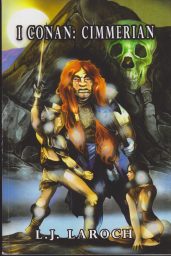 Conan (Sprague de Camp Fan): It has been said that any Conan story not written by Robert E. Howard is fan fiction. I agree with that but “fan fiction” doesn’t necessarily equal bad fiction. And there is the distinction between authorized and unauthorized continuations. This book is unauthorized fan fiction. The publisher is Dorrance Publishing. You might have seen their ads on the internet. As vanity presses go, they are one of the oldest (established in 1920) and appear to be fairly successful.
Conan (Sprague de Camp Fan): It has been said that any Conan story not written by Robert E. Howard is fan fiction. I agree with that but “fan fiction” doesn’t necessarily equal bad fiction. And there is the distinction between authorized and unauthorized continuations. This book is unauthorized fan fiction. The publisher is Dorrance Publishing. You might have seen their ads on the internet. As vanity presses go, they are one of the oldest (established in 1920) and appear to be fairly successful.
Pulp (Dark Worlds Quarterly): 1924-1925 proved a good two years if you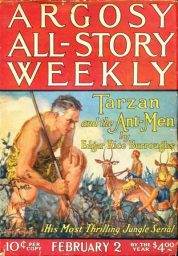 liked novel serials with four by Edgar Rice Burroughs, two by Ralph Milne Farley and singles by Ray Cummings, Rufus King and Wil McMorrow. Several of these would become paperback perennials for ACE Books. For Semi-Dual fans, there was another installment of the world’s most famous ghost buster. The short stories are mixed bag with familiar names like Paul Anderson, Robert W. Sneddon, B. Wallis, E. Charles Vivian and Fred Jackson.
liked novel serials with four by Edgar Rice Burroughs, two by Ralph Milne Farley and singles by Ray Cummings, Rufus King and Wil McMorrow. Several of these would become paperback perennials for ACE Books. For Semi-Dual fans, there was another installment of the world’s most famous ghost buster. The short stories are mixed bag with familiar names like Paul Anderson, Robert W. Sneddon, B. Wallis, E. Charles Vivian and Fred Jackson.
Radio (Tangent Online): The Black Museum (1952) aired “A Lady’s Shoe” (in the United States and as near as historians can reasonably ascertain) on May 27, 1952. This is only the 10th episode we’ve run of this show since 2018 and the first since September 2021 over 2 years ago, so a bit of background is in order for newcomers to this sometimes grisly program.
Greyhawk (Greyhawkery): Hail Greyhawk faithful. Today I’m quickly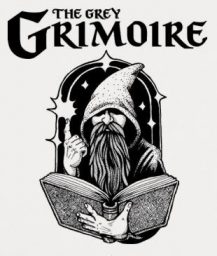 promoting the fantastic work behind the latest Greyhawk fanzine, The Grey Grimoire! This inaugural issue features a variety of articles for a diverse selection of game systems by many wonderful authors and artists from the Greyhawk community.
promoting the fantastic work behind the latest Greyhawk fanzine, The Grey Grimoire! This inaugural issue features a variety of articles for a diverse selection of game systems by many wonderful authors and artists from the Greyhawk community.
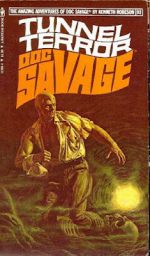 Pulp (Paperback Warrior): I’m no authority on Doc Savage. I’ve read a handful of pulp stories featuring the Man of Bronze and his bickering all-star team of supporting characters. I’ve enjoyed the stories for the most part, but always found the plot-development to build to a disappointing reveal as to who, or what, was creating the hideous, menacing, and all-consuming evil that plagued society for roughly 130-paperback pages.
Pulp (Paperback Warrior): I’m no authority on Doc Savage. I’ve read a handful of pulp stories featuring the Man of Bronze and his bickering all-star team of supporting characters. I’ve enjoyed the stories for the most part, but always found the plot-development to build to a disappointing reveal as to who, or what, was creating the hideous, menacing, and all-consuming evil that plagued society for roughly 130-paperback pages.
Comic Books (Paperback Warrior): Effinger contributed stories to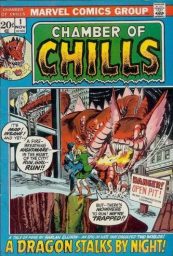 magazines like Haunt of Horror and Fantastic. In the 1970s, Effinger authored comic book stories for publishers like DC and Marvel, including titles like Fantastic Four, Journey into Mystery, and Sword of Sorcery. My first experience with the writer is his story “Moon of Madness, Moon of Fear”, originally published in the first issue of the short-lived Marvel Comics series Chamber of Chills (1972-1976).
magazines like Haunt of Horror and Fantastic. In the 1970s, Effinger authored comic book stories for publishers like DC and Marvel, including titles like Fantastic Four, Journey into Mystery, and Sword of Sorcery. My first experience with the writer is his story “Moon of Madness, Moon of Fear”, originally published in the first issue of the short-lived Marvel Comics series Chamber of Chills (1972-1976).
 Games (Grognardia): And that’s where it remained until the Christmas holidays, when my friend Mike received a copy of a boardgame called Dungeon! Back in those days, it was tradition among my friends to spend our Christmas vacation making the rounds at each other’s houses, showing off the presents we’d received and pronouncing judgment over which of all the gifts we deemed the best. That year, without question, the winner was Dungeon!
Games (Grognardia): And that’s where it remained until the Christmas holidays, when my friend Mike received a copy of a boardgame called Dungeon! Back in those days, it was tradition among my friends to spend our Christmas vacation making the rounds at each other’s houses, showing off the presents we’d received and pronouncing judgment over which of all the gifts we deemed the best. That year, without question, the winner was Dungeon!
Fantasy (Sibilant Fricative): I’ve been trying to wrestle some minimal cogency into an account of Joe Abercrombie’s writing, but am finding it tricky. I know Joe: he’s a smart and charming man, and when he writes Fantasy he does so smartly, with great charm, although his mode of Fantasy is Grimdark: violence, torture, a Machiavellian sense of power-plays behind the façade of society and civilization: homo homini lupus, the randomness of fate, ‘good’ characters as liable to end badly and the bad to triumph as vice versa—though there aren’t really any ‘good’ characters in Abercrombie’s books.
cogency into an account of Joe Abercrombie’s writing, but am finding it tricky. I know Joe: he’s a smart and charming man, and when he writes Fantasy he does so smartly, with great charm, although his mode of Fantasy is Grimdark: violence, torture, a Machiavellian sense of power-plays behind the façade of society and civilization: homo homini lupus, the randomness of fate, ‘good’ characters as liable to end badly and the bad to triumph as vice versa—though there aren’t really any ‘good’ characters in Abercrombie’s books.
 Tolkien (U. of Oxford): Handwritten illustrated letters from Father Christmas written by the author J.R.R. Tolkien to his four children give a touching insight into Tolkien’s personal family life.
Tolkien (U. of Oxford): Handwritten illustrated letters from Father Christmas written by the author J.R.R. Tolkien to his four children give a touching insight into Tolkien’s personal family life.
The illustrated letters are to go on show at a major new exhibition opening at the University of Oxford’s Bodleian Libraries in 2018. Tolkien: Maker of Middle-earth will explore the full breadth of Tolkien’s unique literary imagination from his creation of Middle-earth, the imagined world where The Lord of the Rings, The Hobbit and his other works are set, to his life and work as an artist, poet, medievalist and scholar of languages.
Science Fiction (Marzaat): As I’ve said before, The Weird Tradition group at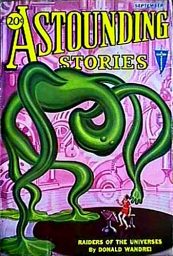 LibraryThing casts its net wide, and sometimes the catches really aren’t weird. In this case, it’s kind of a tedious superscience pulp story. (And I don’t think I found it tedious just because I was tired when I read it.) Not that Donald Wandrei wouldn’t be thought to be a weird writer on occasion as exhibited in “The Red Brain”.
LibraryThing casts its net wide, and sometimes the catches really aren’t weird. In this case, it’s kind of a tedious superscience pulp story. (And I don’t think I found it tedious just because I was tired when I read it.) Not that Donald Wandrei wouldn’t be thought to be a weird writer on occasion as exhibited in “The Red Brain”.
RPG (Monsters & Manuals): The furniture of D&D is high medieval Europe, but tonally, it is a Western. The PCs are not medieval Europeans who are buried beneath complex layers of rank and status and bound by chains of obligation. They are rugged individuals wrestling with the world one-on-one: they are pioneers, not peasants. This is the case for two obvious reasons: the authors were American, and anyway it also just works better that way.
History (Essential Malady): This is a continuation of my journey into the alternative history of World War II which I have covered in a number of posts including two previous books that I reviewed which were The Phony Victory by Peter Hitchens and Stalin’s War by Sean McMeekin. The subject of this review is a good few years older than the other two and I had been meaning to read it for a number of years. It has lost none of its relevance today.
alternative history of World War II which I have covered in a number of posts including two previous books that I reviewed which were The Phony Victory by Peter Hitchens and Stalin’s War by Sean McMeekin. The subject of this review is a good few years older than the other two and I had been meaning to read it for a number of years. It has lost none of its relevance today.
Tolkien (Clerk of Oxford): For the Feast of the Epiphany, here’s a curiosity for you. There are lots of medieval carols about the Epiphany (‘Twelfth Day’, as it was usually called in the Middle Ages) – I posted two last year, and you’ll find more under this tag. This one, however, is a medieval pastiche – a carol written in a version of Middle English, with a bit of Old English thrown in, and published in 1899.
Ghost Stories (Dark Worlds Quarterly): F. Marion Crawford had a successful career as a historical novelist, writing and directing plays. He didn’t need to write ghost stories. But we can be glad that he did. Francis Marion Crawford (1854-1909) was an American writer who produced only one collection, but a very good one, called Wandering Ghosts (1911).
Cinema (Geeks + Gamers): The Iron Claw is amazing.
Fiction (Dark City Underground): James Reasoner’s first novel, Texas Wind, is a great hardboiled private eye tale set in Fort Worth, Texas in the late-1970s. It was originally published by the stingy and unethical Manor Books in 1980; “stingy and unethical” because most writers had to threaten the editor’s life or hire a lawyer to get paid. The writer and critic, Ed Gorman, called Texas Wind, “one of the finest private eye novels I’ve ever read…”
hardboiled private eye tale set in Fort Worth, Texas in the late-1970s. It was originally published by the stingy and unethical Manor Books in 1980; “stingy and unethical” because most writers had to threaten the editor’s life or hire a lawyer to get paid. The writer and critic, Ed Gorman, called Texas Wind, “one of the finest private eye novels I’ve ever read…”
Please give us your valuable comment